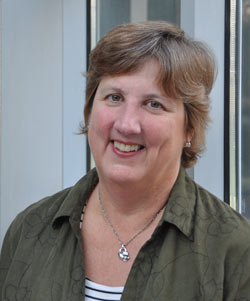
Photo by Janet Sassi
Virginia Strand, D.S.W., professor of social work, has received a $1.8 million grant to strengthen child trauma education and development nationwide.
The grant, which was issued by the federal agency SAMHSA (Substance Abuse and Mental Health Services Administration) provides three years of funding to create the National Center for Social Work Trauma Education and Workforce Development. It also recognizes Fordham as one of 15 leading national “treatment and adaptation” centers in the field of trauma.
The program will be run with the Hunter College School of Social Work and will address a major shortage of social workers trained in evidence-based childhood trauma treatment.
“Our goal is to graduate M.S.W. students who are knowledgeable about trauma and can intervene using a practice approach that is grounded in research,” Strand said. “This is a major paradigm shift, one where students will graduate thinking of themselves as evidence-based practitioners.
“How you approach practice, what your conceptual ‘map’ for intervention is at the time that you graduate, really determines your method of practice for the next 20 years,” Strand added.
Currently, she explained, much of child and adolescent trauma social work is guided by a decades-old “practical wisdom” approach to treatment rather than an evidence-based approach.
In the last decade, there has been a shift in social work practice toward relying on the results of empirical research when designing effective treatments. The shift to evidence-based treatment, she said, must be part of a social work school’s curriculum.
Evidence-based research, she said, looks specifically at what helps a traumatized child, adolescent or his or her family function better. The approach entails developing different social work treatments for clients with specific trauma histories.
While two children with different trauma exposure histories may display similar antisocial behaviors, said Strand, one child may have been sexually abused while another may have experienced a violent death in the family. Evidence-based treatments result in different protocols for different client situations after testing determines what methods are most effective in helping the children manage their particular traumatic experiences.
The grant will be used to provide special trauma training in evidence-based practice for field instructors in agencies that supervise master’s-level students in their social work practicum. It will additionally support the expansion of a GSS course, “Trauma Treatment for Children and Adolescents,” and help disseminate the course to other university-level social work programs.
Once field instructors are trained and the faculty is proficient in trauma-specific courses, students will be trained in one of three evidence-based practices that will ensure they are “culturally competent, trauma-informed” practitioners, said Strand.
The educational model developed at Fordham then will be disseminated in metropolitan New York, Boston, Western Michigan and Los Angeles, and will focus on programs serving low-income urban communities and rural Native American tribes.
Lastly, Strand said the project hopes to train about 125 faculty and field instructors and 150 to 200 students by the end of the three-year project.
“You can’t learn an evidence-based practice by going to class alone,” Strand said. “You learn it by applying it to an actual client and by having ongoing consultations with somebody who is already familiar with the practice.”
